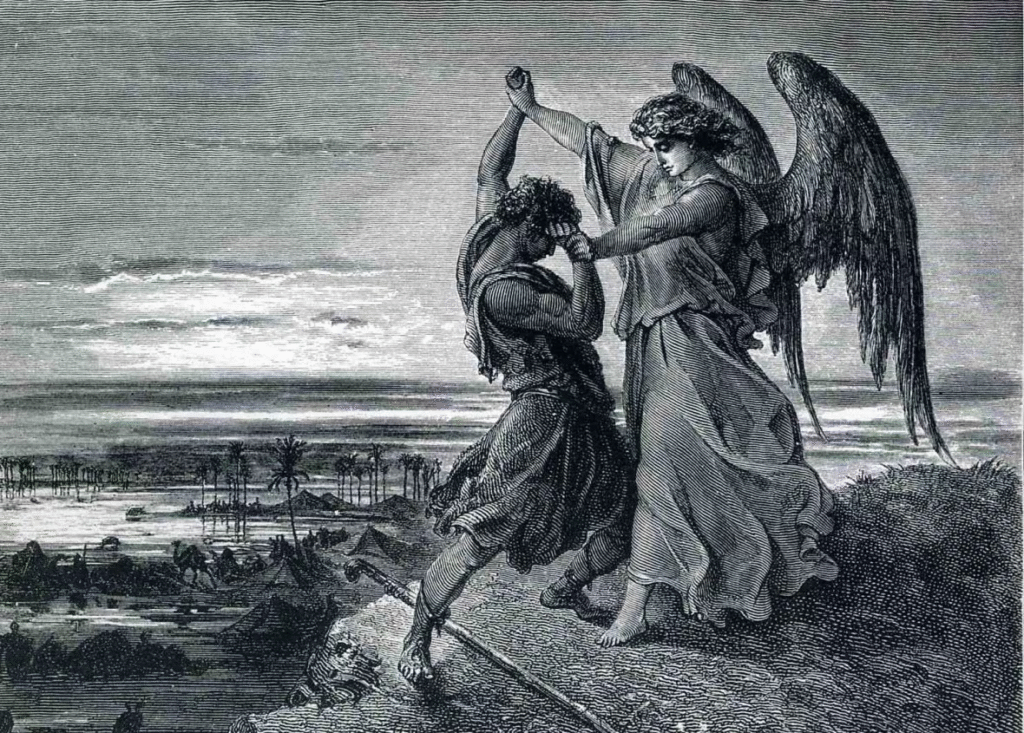The Night of Struggle
Every man, at some point in his life, must face a night of struggle. A moment when the weight of fear, failure, and uncertainty pushes him to the edge. In Genesis 32:22–32, Jacob’s story becomes the archetype of this masculine battle. Alone by the river Jabbok, stripped of comfort and support, Jacob found himself wrestling through the night with a mysterious figure—later revealed to be God Himself.
This was not just a physical fight. It was the embodiment of the masculine experience: solitude, fear, confrontation, and transformation. Jacob’s story invites every man to see his own struggles not as signs of weakness, but as opportunities to meet God face-to-face.
The Weight of Loneliness
Jacob had sent his family, servants, and possessions across the river. The text makes it clear: “Jacob was left alone” (Genesis 32:24).
Loneliness is a crucible. Modern men often fear silence and solitude, filling every moment with noise, screens, or busyness. Yet, as with Jacob, it is in solitude where the most profound transformations take place.
For Jacob, this loneliness was not peaceful. It was the night before meeting his estranged brother Esau—the brother he had deceived, the brother who might kill him. Anxiety, guilt, and dread haunted him. Alone and afraid, Jacob faced the truth of his life.
This is the masculine reality: every man will face nights when he cannot run from his past or distract himself from his fears. In that solitude, the wrestling begins.
Fear as the Trigger
Jacob’s fear was real. He had manipulated, lied, and schemed his way into blessing, and now those choices seemed to be catching up to him. Fear often drives men into confrontation with God.
Fear of failure. Fear of rejection. Fear of death. These are universal masculine fears. Like Jacob, men often try to outwit life, to control outcomes, to depend on their own cunning. But fear eventually strips us down and forces us to admit: we are not in control.
And here lies the paradox—fear, though painful, becomes the spark that forces a man into divine encounter. Without fear, Jacob would never have wrestled with God.
The Wrestling with God

Theological Perspective
Theologians have long debated whether Jacob wrestled with an angel, a man, or God Himself. The narrative suggests all three, but the meaning is clear: Jacob was wrestling with the divine.
- The struggle: Jacob resists, embodying man’s instinct for self-sufficiency. He fights through the night, refusing to surrender.
- The wound: God dislocates Jacob’s hip with a touch, showing that divine power dwarfs human strength. Masculine pride must be broken before blessing can be received.
- The blessing: Jacob clings to God, saying, “I will not let you go unless you bless me.” This perseverance is the hallmark of true masculinity—refusing to let go, even in pain.
- The new identity: Jacob receives a new name, Israel, meaning “he who struggles with God.” His identity shifts from deceiver to one who has prevailed through faith.
The wrestling represents the man’s inner struggle with God’s sovereignty: resisting His will, then surrendering, then receiving transformation.
Masculine Application
Wrestling with God is not a sign of weak faith—it is proof of authentic faith. Passive religion avoids struggle. Real masculinity engages it. Jacob’s fight was not about overpowering God but about refusing to walk away without an encounter.
Modern men must embrace this struggle. In prayer, in repentance, in wrestling with Scripture, we encounter the God who both wounds and blesses.
The Limp as a Mark of Manhood
At dawn, Jacob left the fight limping. His hip had been dislocated, and he would walk with that limp for the rest of his life.
This detail is not incidental. It teaches us that divine encounters leave marks. Masculinity shaped by God is not defined by perfection, but by scars that testify to transformation.
The limp was Jacob’s reminder that strength is not self-made; it comes from God. For modern men, scars—whether physical, emotional, or spiritual—become marks of wisdom and humility. They tell the story of struggle, dependence, and redemption.
Lessons for the Modern Man
- Loneliness is unavoidable
Growth often happens in solitude. Don’t fear it—embrace it. In silence, you will meet God. - Fear can be sacred
Fear exposes limitations and pushes us toward surrender. The key is not to avoid fear, but to wrestle through it. - True masculinity is perseverance
Jacob did not win by overpowering God but by refusing to let go. The masculine spirit is one of endurance. - Wounds are not weakness
Jacob’s limp was not a shameful reminder—it was holy. Men today must learn to see their scars as proof of God’s shaping hand. - Identity is transformed in struggle
Jacob’s name changed because he faced God. Men who wrestle with God discover who they truly are.
Theological Depth
This episode foreshadows the Gospel. Jacob’s struggle with God in the dark night mirrors Christ’s struggle in Gethsemane. Both reveal that victory comes not by avoiding suffering, but by enduring it and submitting to God’s will.
It also highlights the paradox of masculine faith: strength through weakness. Paul echoes this truth in 2 Corinthians 12:9—“My power is made perfect in weakness.” A man becomes strongest when he admits his dependence on God.
Conclusion
Jacob’s wrestling with God is not just an ancient story—it is every man’s story. Nights of solitude, fear, and struggle are unavoidable in the masculine journey. But they are not wasted. They are holy.
To wrestle with God is to face your fears, to confront your past, and to surrender your pride. The fight may leave you limping, but it will also leave you blessed, transformed, and renamed.
True masculinity is not defined by avoiding the fight—it is defined by the courage to enter it, to hold on, and to rise from it marked, humbled, and strengthened.